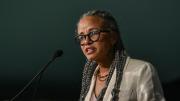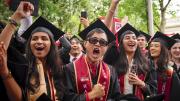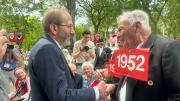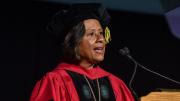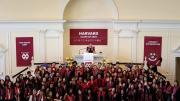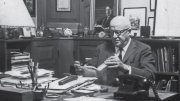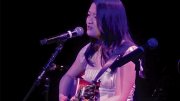Harvard Medical School’s 2025 master’s graduates are entering their professions during what Dean George Q. Daley called “treacherous times.” In his opening remarks at the convocation ceremony, Daley acknowledged to the gathered graduates that science and academia are facing “catastrophic funding cuts” and that “essential lifesaving research is being canceled altogether.”
Daley, who delivered his remarks prior to the keynote speaker, journalist Linda Villarosa, stressed that public health has never been more misunderstood. He pointed to Harvard as “the most direct target of the current administration’s tectonic shift in priorities,” a pointed reference to U.S. Secretary of Health and Human Services Robert F. Kennedy Jr., who has promoted vaccine skepticism and questioned the legitimacy of scientific institutions.
If graduates feared their degrees held limited power in “this turbulent climate,” Daley reassured them otherwise. He emphasized the value of programs like the Master of Science in Media, Medicine, and Health—which received a round of applause when mentioned—and argued that such degrees uniquely position students to defend science and advance equitable health care. (Harvard’s M.D. graduates will be awarded degrees at the Class Day ceremony on Thursday.)
“You wield influence, you wield power,” Daley told graduates. “The power that comes with knowledge, preparation, and training.” Daley noted the dangerous rise of misinformation in public discourse, including the erosion of trust in healthcare providers and scientists. He urged graduates to confront these “pathogens” head-on, armed with the tools they had developed during their course of study.
He offered the example of Comfort Ofori, a 2022 graduate working in vaccine safety and drug surveillance, who is “helping to unpack and falsify destructive narratives” surrounding COVID-19 vaccines, infectious diseases, and health policy. “Because, yes,” Daley said, “it is true that drugs, vaccines, and other medical interventions do come with adverse side effects. But only through studying those effects and understanding complex policy factors around drug surveillance can we effectively combat them.”
Villarosa echoed Daley’s call to action. A journalist, educator, and the author of Under the Skin: The Hidden Toll of Racism on Health in America (2022), Villarosa emphasized that this generation of health professionals has a crucial role to play amid the ongoing spread of misinformation.
“Bad news leads to opportunity,” she said.
Villarosa urged the graduates to keep using the language of inclusion that “might trigger a red flag or worse in a federal grant proposal.” And she told them to embrace a form of leadership she said is often overlooked in medical training: courage. “I’d like to share with you three acts of courage that touched me and have inspired me,” she said. The first took place at a Q&A session with college students near Brooklyn. A young woman training in obstetrics and gynecology described witnessing a childbirth in which the medical team ignored the mother’s intense pain because they were focusing on the clinical protocols to observe.
“She was grimacing and moaning and eventually crying out though no one in the room was paying attention to her,” the student told Villarosa. Overwhelmed and unsure how to respond, the student did what she could—she held the mother’s hand. “I told her, ‘You’re going to be the kind of doctor that the world needs,’” Villarosa said. “What she did was an act of courage.”
The second story centered on two black medical students who challenged a professor’s use of a race-based correction for kidney function (eGFR), a practice rooted in outdated and flawed assumptions about muscle mass. When the professor dismissed their concerns, the students reported him to the administration. “It took guts,” Villarosa said, “to walk out of class and then report the professor. That took courage.”
Her final story focused on artist and activist Michelle Browder, who responded to the legacy of Dr. J. Marion Sims—the so-called father of modern gynecology who experimented on enslaved black women—by creating a memorial and founding a women’s health clinic on the site of Sims’s former practice. “Michelle is now in the completion stage of opening a health and wellness clinic to offer primary and prenatal care for women on the very site of Dr. Sims’s atrocities,” Villarosa said. “That takes courage.”
Villarosa urged the graduates to carry that same spirit into their careers. Their mission, she said, extends beyond medicine to “heal civilization”—through truth, science, empathy, and love. Quoting the late Toni Morrison, Villarosa left them with a call to action: “This is precisely the time when good people go to work….We speak, we write, we take action. That’s how civilizations heal.”
